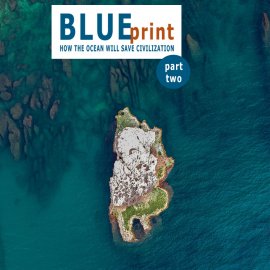Quest for Equity on the Ocean
-
English
-
ListenPause
[intro music]
Welcome to World Ocean Radio…
I’m Peter Neill, Director of the World Ocean Observatory.
We have divided and sub-divided the land with boundaries, arbitrary lines drawn in response to historical events that define territories as nations comprising a descending order of jurisdiction to states, regions, municipalities, and tribal areas – all subject to change given the flow of social and political interest based almost entirely on shifting attitudes based almost entirely on profit by control. Paradoxically, we have also evolved a method for conflict avoidance based almost entirely on consensus that prolongs decisions, satisfies no single interest, and leaves underlying conflict unresolved and enduring. This construct is, by definition, partial and unfair. A sense of inequity, then, is pervasive and the flash points of this contradiction are the source of ongoing misunderstanding, resentment, and community disruption.
Equity is defined as a context for fairness and justice, but it has a second meaning as a measure of “ownership,” a share or investment in an enterprise that may in itself be inequitable as it is not available to every member of society. Questions rise: must equity be equally and inclusively and diversely and justly shared to be realized as a foundation for security and peace within all human institutions? How can this be achieved? Is it even possible given our history of differentiation by race, ethnic identity, religion, financial status, and self-interest?
We continue to struggle with this condition on land; success is elusive.
But what if we redirect our quest for equity from land to ocean -- where the lines are fluid, the resources are fluid, and the opportunity for invention and transformation of values and engagement remain open to change?
To do so, we must accept that: the ocean is a commons, a vast and fecund reservoir of natural resources and natural forces that are accessible by all for the survival of all. This is true and an exhilarating principle on which to base our future.
We use the ocean in two fundamental ways. First, it is a system for exchange of goods, people, and ideas. We transport land-based harvest and manufacture from one place to another as a function of work, supply and demand, and profit from the land. The tools are ships and underwater cables, tankers and pipelines, that enable a system of transfer that is ironically counter-productive by virtue of the conflict it engenders. This a process of taking. Second, the ocean is a vast source of biodiversity and bioactivity that provides us food, water, health, energy, and many other forms of sustenance, physical and spiritual. This is a process of giving.
Here is the danger. We are at risk of applying the taking values and behaviors that have brought the land to near exhaustion, increasing inequity, injustice, and inadequacy to debilitating consequence to the sea. We are consuming resources beyond the capacity of the Earth to provide, corrupting the fertility of the fields, polluting the inland waters, poisoning the air, and building a society based on short-term interest over long term viability. This cannot endure or, simply put, we will not endure.
Thus, if we look to the ocean as a place to begin again, in the welcome of its giving, and share such bounty as if we are, each and every one, equal shareholders, not just taking, buying and selling, as our principal focus, but giving, giving back to sustain our equity, to build up our investment over time to meet the demands of diversity, inclusion, equality, justice, and survival. An article in the Stanford Social Innovation Review (Sept 15, 2016) offers this revised understanding of equity: “Equity describes something deeper and more complex. It is about each of us getting what we need to survive or succeed – access to opportunity, networks, resources, and supports, based on where we are and where do we want to go.”
Where we are? When we look around at the social strife, dislocation, poverty, starvation, and pandemic, it must be concluded that we are not is a good place. Where do we want to go? If the land cannot sustain us in these fundamental ways, then we must go to sea.
We will discuss these issues, and more, in future editions of World Ocean Radio.
[outro music]
This week on World Ocean Radio: part two of a multi-part series entitled "BLUEprint: How the Ocean Will Save Civilization." In this episode, QUEST FOR EQUITY ON THE OCEAN, we discuss the concept of equity as it relates to ownership and share of investment, and we ask listeners to consider whether equity can be equally and inclusively shared in order for there to be security and peace for all. And we assert that if we look to the ocean as a place for equal shareholders not just to take, buy, and sell but also to give back, we may sustain our equity, and to build investment to meet the demands of diversity, inclusion, equality, justice, and survival.
Part two of a multi-part series
The BLUEprint series will serve to outline a new and sustainable
way forward for civilization, with the ocean leading the way.

About World Ocean Radio
Since 2009, a weekly 5-minute podcast covering a broad spectrum of ocean issues from science and education to advocacy and exemplary projects. World Ocean Radio, a project of the World Ocean Observatory is available for syndicated use at no cost by college and community radio stations worldwide. Contact [email protected] if you are interested in becoming an affiliate or know of a radio station that should be broadcasting these episodes each week.
Image
Photo by Emile Arab on Unsplash
- Login to post comments



